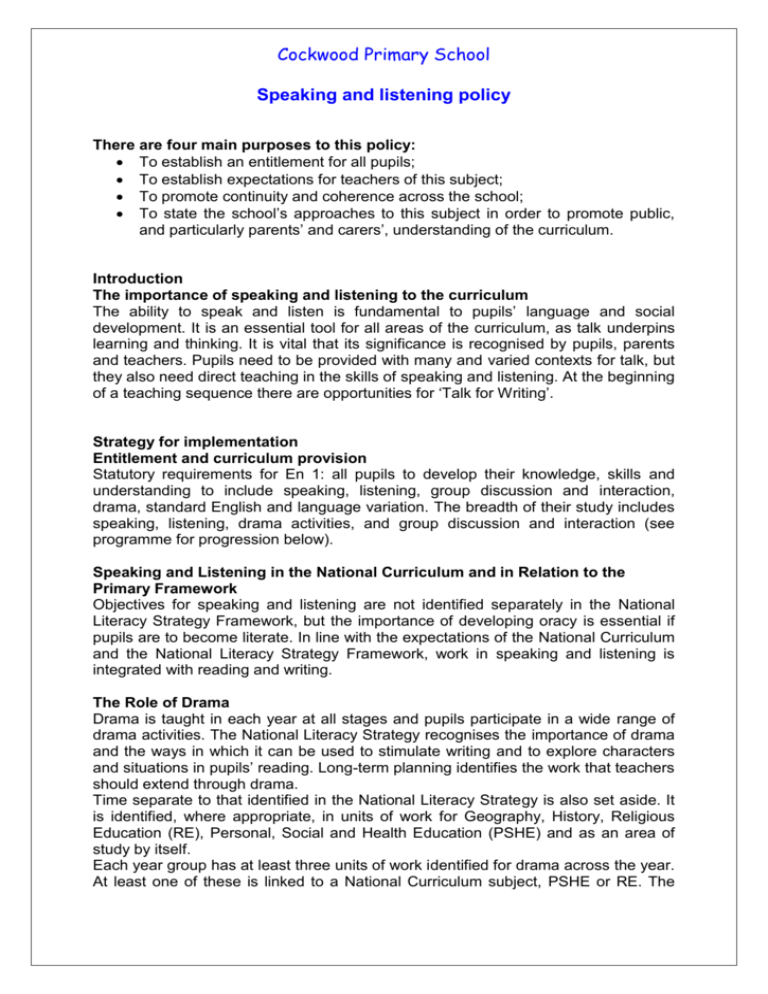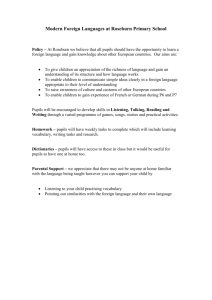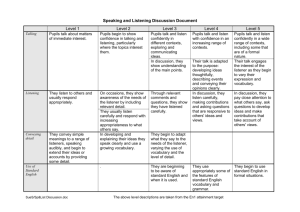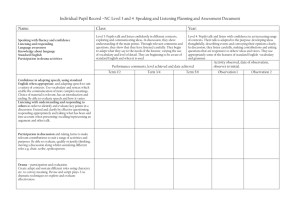Cockwood Primary School
advertisement

Cockwood Primary School Speaking and listening policy There are four main purposes to this policy: To establish an entitlement for all pupils; To establish expectations for teachers of this subject; To promote continuity and coherence across the school; To state the school’s approaches to this subject in order to promote public, and particularly parents’ and carers’, understanding of the curriculum. Introduction The importance of speaking and listening to the curriculum The ability to speak and listen is fundamental to pupils’ language and social development. It is an essential tool for all areas of the curriculum, as talk underpins learning and thinking. It is vital that its significance is recognised by pupils, parents and teachers. Pupils need to be provided with many and varied contexts for talk, but they also need direct teaching in the skills of speaking and listening. At the beginning of a teaching sequence there are opportunities for ‘Talk for Writing’. Strategy for implementation Entitlement and curriculum provision Statutory requirements for En 1: all pupils to develop their knowledge, skills and understanding to include speaking, listening, group discussion and interaction, drama, standard English and language variation. The breadth of their study includes speaking, listening, drama activities, and group discussion and interaction (see programme for progression below). Speaking and Listening in the National Curriculum and in Relation to the Primary Framework Objectives for speaking and listening are not identified separately in the National Literacy Strategy Framework, but the importance of developing oracy is essential if pupils are to become literate. In line with the expectations of the National Curriculum and the National Literacy Strategy Framework, work in speaking and listening is integrated with reading and writing. The Role of Drama Drama is taught in each year at all stages and pupils participate in a wide range of drama activities. The National Literacy Strategy recognises the importance of drama and the ways in which it can be used to stimulate writing and to explore characters and situations in pupils’ reading. Long-term planning identifies the work that teachers should extend through drama. Time separate to that identified in the National Literacy Strategy is also set aside. It is identified, where appropriate, in units of work for Geography, History, Religious Education (RE), Personal, Social and Health Education (PSHE) and as an area of study by itself. Each year group has at least three units of work identified for drama across the year. At least one of these is linked to a National Curriculum subject, PSHE or RE. The Cockwood Primary School units are designed to enable pupils to explore and extend their experience of life and language, providing exciting, imaginative, yet safe, contexts for learning. Teaching and Learning In order to promote high quality speaking and listening, teachers adopt roles as identified in the National Oracy Project (1990). It is not expected that this happens in each lesson but teachers are expected to incorporate them over a period of time (across each week). These roles involve: modelling dialogue, e.g. turn taking, offering opinions and inviting response; modelling listening, e.g. the use of non-verbal communication, respecting, even if disagreeing with, the views of others; modelling values, e.g. encouraging the participation of retiring or reticent pupils, praising boys who display sensitivity; modelling participation, e.g. recognising the value of being seen as a learner alongside the pupils; providing a wide range of contexts for speaking and listening; supporting the pupils by providing clear structures for tasks which require the pupils to learn through talk; sharing roles with the pupils, e.g. as questioner, the ‘expert’ on a particular topic. Pupils have a variety of opportunities to use talk for learning. These will not occur in every lesson but teachers are expected to incorporate them over a period of time (across each week). These are: playing an active role in directing their own learning, e.g. making decisions about how to approach a task, selecting appropriate resources; engaging in speaking and listening in a variety of groupings and settings, e.g. reading out loud as an individual and a larger group during shared reading, working collaboratively on an investigation during group work, reporting findings as a newscaster during a plenary session, interviewing people as part of a research project, acting as a guide for a visitor to the school; using language creatively and imaginatively, e.g. through role-play, hotseating, storytelling; demonstrating what they know and evaluating their understanding, e.g. involvement in plenary sessions, use of response partners. The learning environment is organised to facilitate talk by: using space effectively, e.g. in the Foundation Stage and at Key Stage 1 by providing listening, role-play and activity areas. At all key stages, furniture and tables are arranged appropriately, creating displays which are interactive; providing resources to support speaking and listening, e.g. puppets, tape recorders, headphones/headsets. Cockwood Primary School Progression and continuity Foundation Stage Speaking and listening is at the core of the programme for developing language and literacy as detailed in “Early Learning Goals” Pupils have opportunities to develop and practise their talk through play, to listen attentively and with increasing stamina and discrimination, to respond appropriately and confidently, and to inter-act with others. This provides a sound foundation for the programme of study for KS1. Key Stage 1 At Key Stage 1 pupils have opportunities to speak to a range of audiences, describing incidents from their own experience, retelling and telling real and imagined stories, reading stories and poems aloud, and giving presentations to explain a process or impart information. They listen to stories and poems, sustaining concentration and participating appropriately, follow teachers’ instructions and express their views about versions of stories on tape and video. They ask relevant questions of adults and peers, and express their opinion of others’ plays and presentations. They are taught how to operate in groups, e.g. taking turns to speak, listening to others’ suggestions, allocating tasks and reporting group views to the rest of the class. While engaged in speaking and listening activities, pupils are introduced to some of the main features of spoken Standard English and they are taught how speech varies according to circumstance and audience. In drama the emphasis is on the use of improvisation through role-play as the pupils play inventively and with concentration. They perform traditional stories and those devised by themselves to peers, and they are involved in the presentation of work from different areas of the curriculum. When reflecting on their own dramatic activities and the performances of others, e.g. visiting theatre groups, the pupils consider motives, story development and their personal response to the drama. Key Stage 2 (Years 3 & 4) In Years 3 and 4 pupils continue to read stories and poems aloud, both individually and as a larger group, with an increasing emphasis on the use of voice for effect. There are opportunities to listen to, and participate in, storytelling, and pupils develop their use of talk to explain a model, process or impart information. Pupils talk in a variety of contexts and reflect on talk, e.g. how it varies for purpose and audience. When listening to a talk by an adult, an audio/video broadcast or a class discussion, pupils identify main points, ask relevant questions and offer their own opinions. Group interaction is developed, e.g. agreeing a plan for investigation, identifying and using resources effectively, accommodating different views and looking for consensus. In drama pupils write and perform drama for a range of audiences using scripts, sometimes based on improvisations, to develop events and characters. Drama is used to explore texts, both fiction and non-fiction, and to focus on key elements of narrative development. Pupils have many opportunities to act in role, using language appropriate to context, and recognising how the roles in situations can be approached from different viewpoints. When responding to live and recorded performances, pupils focus on particular themes, characters and ideas, and have the opportunity to compare different types of performances. Cockwood Primary School Key Stage 2 (Years 5 & 6) In Years 5 and 6 pupils have opportunities to give individual talks, conduct interviews, both individually and in groups, and, having presented arguments on matters of concern, participate in whole-class debates. They consider language variation, Standard English and dialect, and identify the features of language used in formal and informal contexts. They focus on the language of persuasion and identify how words, sounds and images relate to each other in audio and video broadcasts. Group work is further developed, e.g. identifying next steps for action, modifying plans, achieving compromise, taking on a variety of roles and evaluating the work of the group. In drama the pupils develop scripts based on incidents from novels and poems. They write for a specific audience and redraft their own scripts created for performance in the light of feedback. Improvisation and working in role are used to explore ways of life in different cultures or historical periods, and themes relating to personal, social and moral development. In their response to a variety of performances, pupils comment critically on the overall impact, their response to the underlying themes and the use of specific theatrical effects, e.g. gesture, movement, sound and silence. Pupils have the opportunity to take part in a production, learning the aspects of reading a script, costumes, stage direction and how they all come together. Inclusion Teachers set appropriate challenges for all pupils. Where pupils’ attainment falls significantly below the expected levels in speaking and listening for a variety of reasons (e.g. language disorder, acute reticence, hearing impairment) then special provision is made for additional support through guided speaking and listening activities. The role of parents and carers Parents are encouraged to attend workshops, dramatic performances and demonstration lessons where the power of speaking as a tool for learning is exploited. The importance of oracy is reinforced by setting some homework tasks which involve pupils in speaking and listening, e.g. recording interviews, compiling and completing questionnaires, preparing talks, watching television programmes and giving oral feedback, collecting information for oral history projects. The contribution of speaking and listening to other aspects of the curriculum Opportunities are provided where: speaking and listening are the focus of the teaching, even though the subject matter may relate to another area of the curriculum, e.g. organising an interview with an ‘expert’ on acid rain, considering the role of the questioner, the range of questions to ask and the pace of the interview; another subject is the focus of the teaching, but it is planned and organised in order that pupils can reinforce and practise speaking and listening skills, e.g. working in pairs, prioritising items for inclusion on a charter of pupils’ rights and responsibilities; Cockwood Primary School pupils have opportunities to use talk to investigate, evaluate or report, when another area of the curriculum is the focus for the teaching e.g. demonstrating how an origami book is made. Assessment and recording All teachers are responsible for assessment. In partnership with the Subject Leader and the Headteacher they: ensure that some of the key learning objectives selected for assessment purposes in literacy sessions have a speaking and listening focus; plan for assessments in speaking and listening pay particular attention to the assessment of pupils with IEPs that relate to improving speaking and listening. Headteacher Chair of Teaching & Learning Committee _______________________________ ___________________________________ Reviewed Spring 2012 Reviewed Spring 2014 To be reviewed Spring 2016






![afl_mat[1]](http://s2.studylib.net/store/data/005387843_1-8371eaaba182de7da429cb4369cd28fc-300x300.png)

